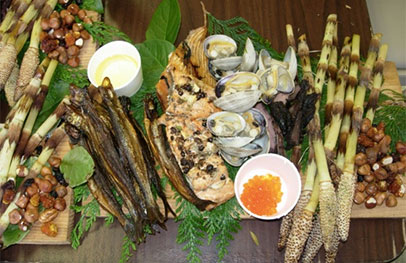
Image from: http://indiancountrytodaymedianetwork.com/gallery/photo/16-photos-traditional-cooking-salish-way-155329
“Salish Bounty: Native American Foods of Puget Sound,” reads a sign in the open space to the right of the circulation desk in Collin’s Memorial Library. In the glass display cases in the center of the room are carefully pressed and labeled flora. On the walls are large posters explaining the traditions and traditions surrounding food in Salish culture. One core value sticks out to me, “Food is a blessing, gratefully and respectfully gathered and prepared, given and received with just as much gratification and respect”.
Salish peoples are a group of First Nations/Native Americans who reside in the coastal and inland regions of the Pacific Northwest. The arrival of colonial settlers “altered their ecosystem and limited their access to lands and waters, making it increasingly hard for Coast Salish people to collect traditional foods” (Burke Museum). The reservation system, thought to be a solution to this issue, introduced foods which were poor substitutes to the rich Salish diet.
As I researched more into the significance of this travelling exhibit I learned more about the escalating health problems Native Americans face. Academics such as Leslie Korn, Ph.d., MPH, author of Rhythms of Recovery: Trauma, Nature, and the Body and director of the Center for Traditional Medicine in Olympia, Washington cannot help draw the connection to the divergence from a balanced traditional diet.
Many Salish tribes, schools, and community groups are now working hard to instill cultural values such as eating with the seasons and eating a variety of foods back into their communities. More information about the history of Salish traditional foods can be found in the exhibit on the first floor of the library. In the process of helping put together this exhibit I considered the ways in which general food traditions have evolved from fast food to supermarkets to restaurants to cafeterias, does our society build a culture around respecting food or using it as a tool? Does the act of gorging oneself during a ceremonial feast devalue the food that we make or does it show appreciation?
– By Janne Deng
